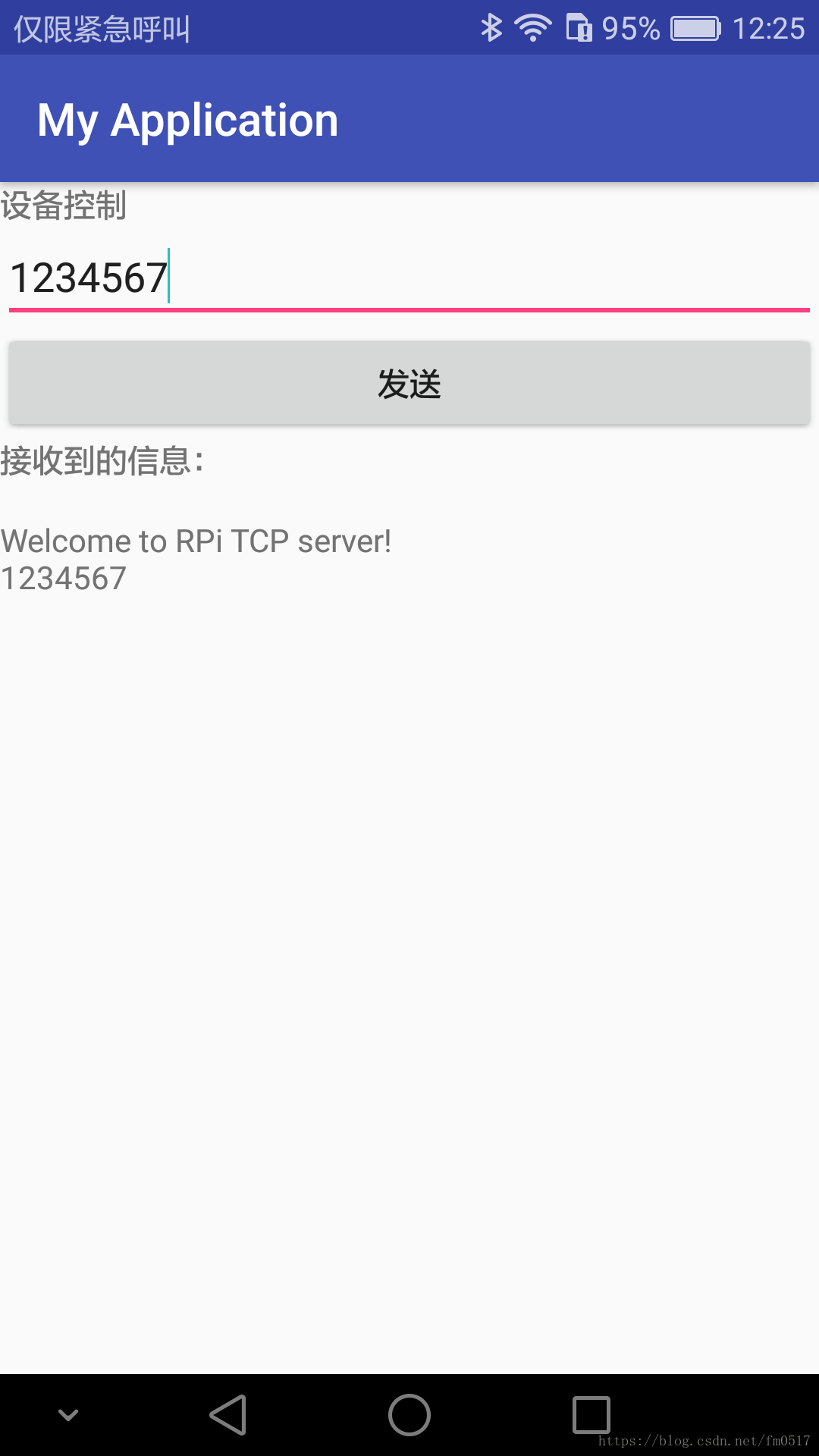转自:https://blog.csdn.net/lj779323436/article/details/79911322
我在此基础上时间并进行了些许修正。
先在树莓派上创建热点:
https://blog.csdn.net/fm0517/article/details/80939113
在树莓派上编写脚本代码:tcpserver.py
#!/usr/bin/python
#coding=utf-8
import socket
import time
import sys
HOST_IP = "192.168.12.1" #我的树莓派作为AP热点的ip地址
HOST_PORT = 7654 #端口号
print("Starting socket: TCP...")
socket_tcp = socket.socket(socket.AF_INET, socket.SOCK_STREAM) #创建socket
print("TCP server listen @ %s:%d!" %(HOST_IP, HOST_PORT) )
host_addr = (HOST_IP, HOST_PORT)
socket_tcp.bind(host_addr) #绑定我的树莓派的ip地址和端口号
socket_tcp.listen(1) #listen函数的参数是监听客户端的个数,这里只监听一个,即只允许与一个客户端创建连接
while True:
print ('waiting for connection...')
socket_con, (client_ip, client_port) = socket_tcp.accept() #接收客户端的请求
print("Connection accepted from %s." %client_ip)
socket_con.send("Welcome to RPi TCP server!") #发送数据
while True:
data=socket_con.recv(1024) #接收数据
if data: #如果数据不为空,则打印数据,并将数据转发给客户端
print(data)
socket_con.send(data)
socket_tcp.close()
用AndroidStudio创建安卓工程MyApplication:
1.activity_main.xml
<?xml version="1.0" encoding="utf-8"?>
<LinearLayout xmlns:android="http://schemas.android.com/apk/res/android"
xmlns:app="http://schemas.android.com/apk/res-auto"
xmlns:tools="http://schemas.android.com/tools"
android:layout_width="match_parent"
android:layout_height="match_parent"
android:orientation="vertical"
tools:context="lh.wifidemo.ui.activity.Device_Control_Activity">
<TextView
android:layout_width="match_parent"
android:layout_height="wrap_content"
android:text="设备控制"/>
<EditText
android:layout_width="match_parent"
android:layout_height="wrap_content"
android:id="@+id/et_send"/>
<Button
android:layout_width="match_parent"
android:layout_height="wrap_content"
android:text="发送"
android:id="@+id/bt_send"/>
<TextView
android:layout_width="match_parent"
android:layout_height="wrap_content"
android:text="接收到的信息:"/>
<TextView
android:layout_width="match_parent"
android:layout_height="wrap_content"
android:id="@+id/tv_recv"/>
</LinearLayout>
2.MainActivity.java
package com.example.chenth.myapplication;
import android.os.Handler;
import android.support.v7.app.AppCompatActivity;
import android.os.Bundle;
import android.view.View;
import android.widget.Button;
import android.widget.EditText;
import android.widget.TextView;
import java.io.BufferedReader;
import java.io.BufferedWriter;
import java.io.IOException;
import java.io.InputStream;
import java.io.InputStreamReader;
import java.io.OutputStream;
import java.io.OutputStreamWriter;
import java.io.PrintWriter;
import java.net.Socket;
/*import com.example.chenth.myapplication.R;*/
public class MainActivity extends AppCompatActivity {
private EditText et_send;
private Button bt_send;
private TextView tv_recv;
private String send_buff=null;
private String recv_buff=null;
private Handler handler = null;
Socket socket = null;
@Override
protected void onCreate(Bundle savedInstanceState) {
super.onCreate(savedInstanceState);
setContentView(R.layout.activity_main);
initView();
handler = new Handler();
//单开一个线程来进行socket通信
new Thread(new Runnable() {
@Override
public void run() {
try {
socket = new Socket("192.168.12.1" , 7654);
if (socket!=null) {
System.out.println("###################");
while (true) { //循环进行收发
recv();
send();
Thread.sleep(50);
}
}
else
System.out.println("socket is null");
} catch (Exception e) {
e.printStackTrace();
}
}
}).start();
send();
}
private void recv() {
//单开一个线程循环接收来自服务器端的消息
InputStream inputStream = null;
try {
inputStream = socket.getInputStream();
} catch (IOException e) {
e.printStackTrace();
}
if (inputStream!=null){
try {
byte[] buffer = new byte[1024];
int count = inputStream.read(buffer);//count是传输的字节数
recv_buff = new String(buffer);//socket通信传输的是byte类型,需要转为String类型
System.out.println(recv_buff);
} catch (IOException e) {
e.printStackTrace();
}
}
//将受到的数据显示在TextView上
if (recv_buff!=null){
handler.post(runnableUi);
}
}
//不能在子线程中刷新UI,应为textView是主线程建立的
Runnable runnableUi = new Runnable() {
@Override
public void run() {
tv_recv.append("n"+recv_buff);
}
};
private void send() {
bt_send.setOnClickListener(new View.OnClickListener() {
@Override
public void onClick(View v) {
new Thread(new Runnable() {
@Override
public void run() {
send_buff = et_send.getText().toString();
//向服务器端发送消息
System.out.println("------------------------");
OutputStream outputStream=null;
try {
outputStream = socket.getOutputStream();
} catch (IOException e) {
e.printStackTrace();
}
if(outputStream!=null){
try {
outputStream.write(send_buff.getBytes());
System.out.println("1111111111111111111111");
outputStream.flush();
} catch (IOException e) {
e.printStackTrace();
}
}
}
}).start();
}
});
}
private void initView() {
et_send = (EditText) findViewById(R.id.et_send);
bt_send = (Button) findViewById(R.id.bt_send);
tv_recv = (TextView) findViewById(R.id.tv_recv);
}
}
3. AndroidManifest.xml
主要是增加了网络访问权限:
<uses-permission android:name="android.permission.INTERNET"/><?xml version="1.0" encoding="utf-8"?>
<manifest xmlns:android="http://schemas.android.com/apk/res/android"
package="com.example.chenth.myapplication">
<uses-permission android:name="android.permission.INTERNET"/>
<application
android:allowBackup="true"
android:icon="@mipmap/ic_launcher"
android:label="@string/app_name"
android:roundIcon="@mipmap/ic_launcher_round"
android:supportsRtl="true"
android:theme="@style/AppTheme">
<activity
android:name=".MainActivity"
android:label="@string/app_name">
<intent-filter>
<action android:name="android.intent.action.MAIN" />
<category android:name="android.intent.category.LAUNCHER" />
</intent-filter>
</activity>
</application>
</manifest>这里有几个地方需要特别注意:
1、创建socket时需要开一个子线程,而不能直接在主线程中完成,否则会报错
2、当接收来自树莓派服务器的消息时,需要刷新TextView,而刷新TextView的操作不能直接在子线程中完成,需要用Handler来实现,否则会报错,提示view只能由源线程来更改
整个项目需要先启动树莓派,然后手机连上树莓派的WIFI热点,如果想要查看树莓派的输出信息,则可以利用window的远程桌面连接树莓派,也可以用putty这个软件进行命令行控制,当然,有条件的完全可以用HDMI接口给你的树莓派连一个显示器
最后上图:
图1.树莓派上的程序运行:

图2.手机上的程序运行:

最后
以上就是沉默母鸡最近收集整理的关于树莓派与Android客户端进行socket通信的全部内容,更多相关树莓派与Android客户端进行socket通信内容请搜索靠谱客的其他文章。
本图文内容来源于网友提供,作为学习参考使用,或来自网络收集整理,版权属于原作者所有。








发表评论 取消回复